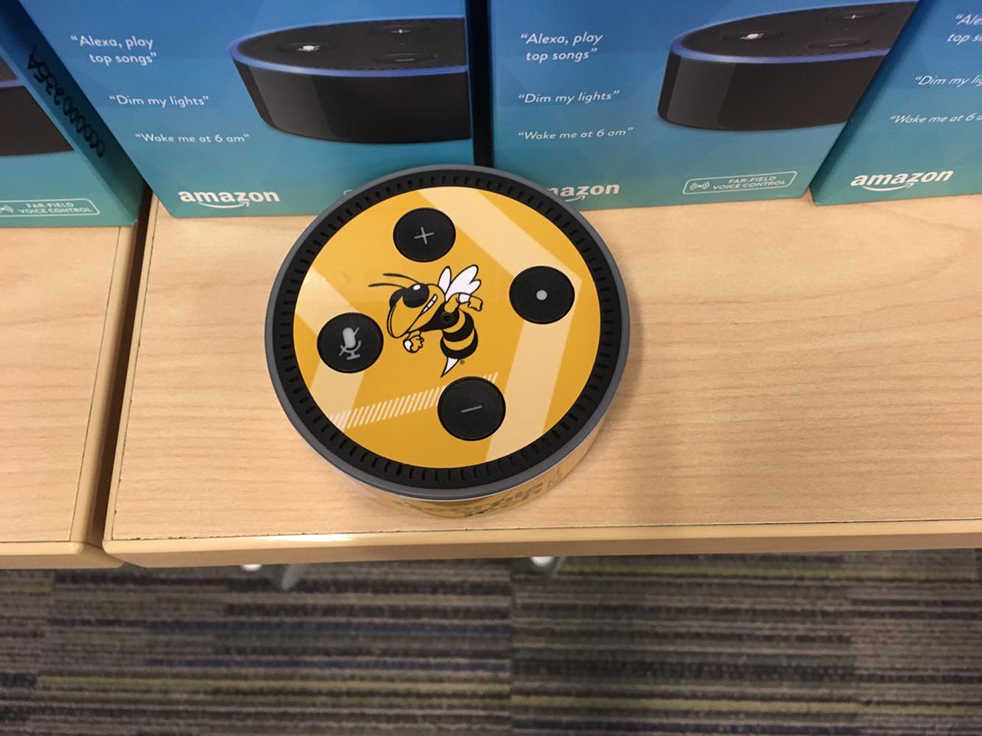On the evening of Feb. 7, all residents of Towers Residence Hall were invited to pick up their very own Amazon Dot, a voice-controlled personal assistant that they would install in their dorm room.
The Dots, which can be paired with a bluetooth speaker, will respond to verbal commands that tell the device to play music, get the weather and listen to the news. Additionally, students will be able to perform several Tech-specific operations.
Residents will be able to install a Georgia Tech module, or “skill,” that allows them to ask the assistant questions specific to their Buzzcards accounts with the keywords “Alexa, ask Buzz…”. Some of the questions include “Alexa, ask Buzz to play Ramblin’ Wreck,” “Alexa, ask Buzz how many dining points I have” or “Alexa, ask Buzz how many swipes I have on my Buzzcard.”
“Alexa” is the keyword to wake up any Amazon voice-recognition device.
The program, being piloted in Towers, was spearheaded by Paul Strouts, vice president of campus services. Once approved, the Information Technology Group (ITG) within the Campus Services Department was responsible for using the Alexa Voice Services and Skills Kit to develop the Tech “skill,” which is the module with Tech-related commands that can be installed on an Alexa-based device.
“Paul gave my team a challenge to leverage Alexa to build a suite of services for residence,” said James Pete, the deputy chief information officer for campus services. “When you think about voice recognition and the personal systems that are out there, we thought that there would be an opportunity to build these services, which would help set us apart. At the same time, this would put us on the leading edge of testing and piloting voice recognition.”
The process of developing the Tech-specific skill was extensive and required many iterations of design. ITG had to consider all the possible phrasing for the questions that students might ask, and Amazon also conducted thorough testing on the interface. ITG also completed some user interface testing with students before it was finalized.
“We’ve had a partnership with Amazon for some time, so we see this as an extension of that,” said Pete. “They’re trying to figure out, too, where Alexa fits into the higher education marketplace.”
Towers was chosen as the pilot location to receive Dots because of its proximity to another residence hall of the same size, which will allow campus services to compare the populations. Pre-distribution surveys have already been done, and surveys will be done in the coming weeks in order to measure student satisfaction.
After an initial period of time to see how students are interacting with the Dots, the ITG will continue to develop programs that allow students to ask Alexa to file a maintenance request or find out what is for dinner at the local dining hall.
On Feb. 7, students headed over to the Glenn-Towers Connector to pick up the Dots, learn how to use the device and how to install the Tech skill. Each device was branded with Tech-
themed designs.
The ITG is not the only group that can create programs to be tested on the Dots. The presence of the devices will allow anyone interested in voice recognition or intelligent technology to test their own code.
Researchers and other departments on campus are interested in utilizing the collection of Dots.
With any new technology, concerns about privacy and security are sure to arise. Pete and the other members of ITG said that they had taken these concerns into account.
For one, the device can be triggered to “wake up” with four different words, which means that even if there are four students living in a room, there will not be confusion between devices. It is also possible that as the technology develops, the device will do a better job at differentiating between voices.
According to Pete, the information that the Dots can currently provide, like meal swipe balance, is not especially sensitive. However, as the interface develops, more capabilities will be added. Students might be able to shut off certain capabilities when they leave the room, or speak a PIN number in order to confirm their identity.
